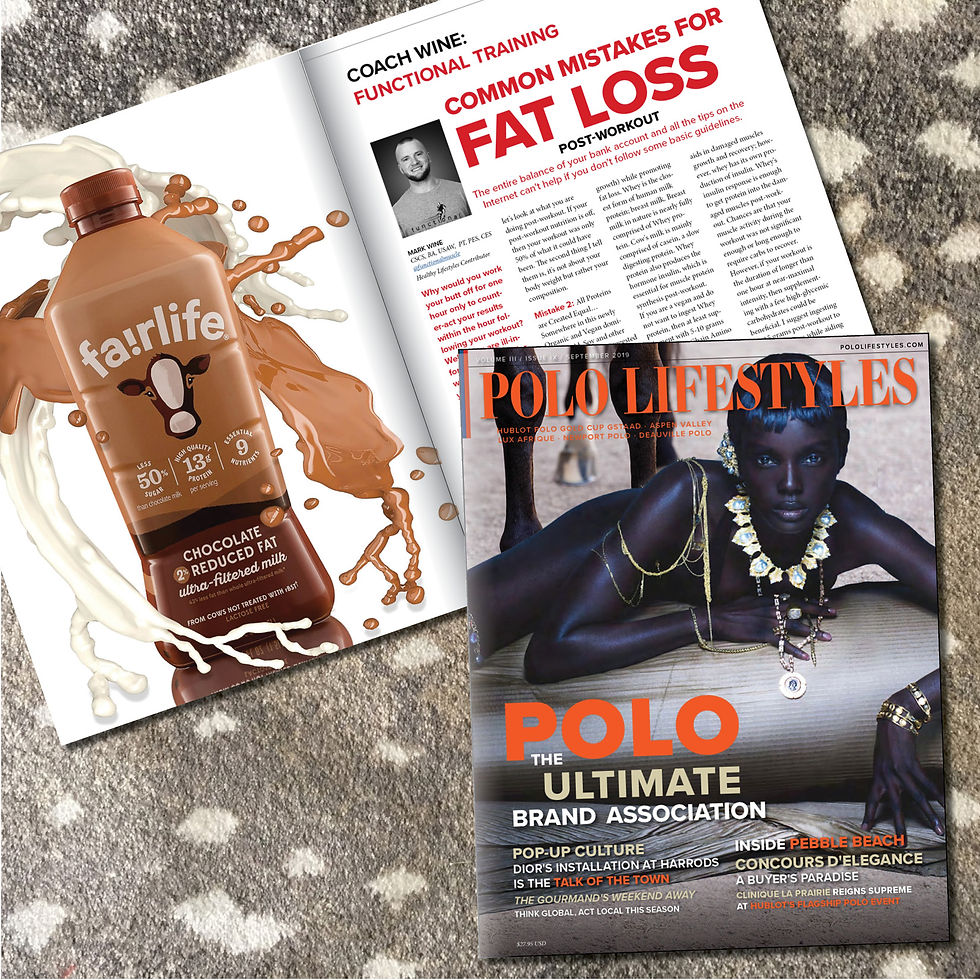Common Mistakes for Fat Loss Post-Workout
- Mark Wine
- Aug 26, 2019
- 3 min read

Why would you work your butt off for one hour only to counter-act your results within the hour following your workout? Well if you are ill-informed or unfamiliar with the truth, then you just might be doing that.
Mistake 1: My Workout is Over Once I am Physically Done with my Work… This cannot be further from the truth. In fact, physical exertion and post-workout nutrition go hand-in-hand. The most common thing I hear as a Strength and Conditioning Coach and Personal Trainer is “I am working my butt off, but I am not losing weight.” The first thing I tell them is, let’s look at what you are doing post-workout. If your post-workout nutrition is off, then your workout was only 50% of what it could have been. The second thing I tell them is, it’s not about your body weight but rather your composition.
Mistake 2: All Proteins are Created Equal… Somewhere in this newly Organic and Vegan dominant world, Soy and other proteins have been suggested as quality proteins. I always ask my athletes and clients this, “would you put unleaded gas in a high-performance race car?” Of course not! So post-workout, you shouldn’t ingest anything other than at least 20 grams of pure Whey protein. You should also select to supplement with Essential Amino Acids (EAA) post-workout, at least 5-10 grams. Whey and EAA have shown to significantly increase muscle protein synthesis (muscle growth) while promoting fat loss. Whey is the closest form of human milk protein; breast milk. Breast milk in nature is nearly fully comprised of Whey protein. Cow’s milk is mainly comprised of casein, a slow digesting protein. Whey protein also produces the hormone insulin, which is essential for muscle protein synthesis post-workout. If you are a vegan and do not want to ingest Whey protein, then at least supplement with 5-10 grams of Branched Chain Amino Acids (BCAA).
Mistake 3: Carbohydrates are necessary… If your goal is fat loss, avoid ingesting carbohydrates immediately post-workout. Research has shown that supplementing whey protein loaded with EAA has been significant in promoting muscle protein synthesis. Carbohydrates are often prescribed to increase the hormone insulin, which aids in damaged muscles growth and recovery; however, whey has its own production of insulin. Whey’s insulin response is enough to get protein into the damaged muscles post-workout. Chances are that your muscle activity during the workout was not significant enough or long enough to require carbs to recover. However, if your workout is the duration of longer than one hour at near-maximal intensity, then supplementing with a few high-glycemic carbohydrates could be beneficial. I suggest ingesting 10-15 grams post-workout to continue fat loss while aiding in recovery.
Mistake 4: Drinking Caffeine Helps Burn fat… Caffeine increases a stress hormone named “cortisol.” Cortisol does damage to muscle and can even cause more mental damage when levels are high. Cortisol can turn our body from an anabolic state (i.e. muscle growth) to a catabolic state (i.e. muscle destruction). To fight cortisol levels, try ingesting Vitamin C post-workout; select a few and even up to ten grams. I suggest a vitamin C supplement for ease of ingestion.
Mistake 5: As long as I do it a Couple Times per Week I Will be OK… Wrong, being consistent is the only way to achieve true results. Most muscular hypertrophy adaptations require 6-8 weeks. This is the easiest and hardest thing to understand, believe it or not. So be disciplined because your results are depending on it.





代发外链 提权重点击找我;
游戏推广 游戏推广;
Fortune Tiger Fortune Tiger;
Fortune Tiger Slots Fortune…
谷歌马甲包/ 谷歌马甲包;
谷歌霸屏 谷歌霸屏;
מכונות ETPU מכונות ETPU;
;ماكينات اي تي بي…
آلات إي بي بي…
ETPU maşınları ETPU maşınları;
ETPUマシン ETPUマシン;
ETPU 기계 ETPU 기계;
代发外链 提权重点击找我;
游戏推广 游戏推广;
Fortune Tiger Fortune Tiger;
Fortune Tiger Slots Fortune…
谷歌马甲包/ 谷歌马甲包;
谷歌霸屏 谷歌霸屏;
מכונות ETPU מכונות ETPU;
;ماكينات اي تي بي…
آلات إي بي بي…
ETPU maşınları ETPU maşınları;
ETPUマシン ETPUマシン;
ETPU 기계 ETPU 기계;
google 优化 seo技术+jingcheng-seo.com+秒收录;
Fortune Tiger Fortune Tiger;
Fortune Tiger Fortune Tiger;
Fortune Tiger Fortune Tiger;
Fortune Tiger Slots Fortune…
站群/ 站群
gamesimes gamesimes;
03topgame 03topgame
EPS Machine EPS Cutting…
EPS Machine EPS and…
EPP Machine EPP Shape…
Fortune Tiger Fortune Tiger;
EPS Machine EPS and…
betwin betwin;
777 777;
slots slots;
Fortune Tiger Fortune Tiger;
google seo…
03topgame 03topgame;
gamesimes gamesimes;
Fortune Tiger…
Fortune Tiger…
Fortune Tiger…
EPS Machine…
EPS Machine…
seo seo;
betwin betwin;
777 777;
slots slots;
Fortune Tiger…
seo优化 SEO优化;
bet bet;
谷歌seo推广 游戏出海seo,引流,快排,蜘蛛池租售;
Fortune Tiger Fortune Tiger;
Fortune Tiger Fortune Tiger;
Fortune Tiger Fortune Tiger;
Fortune Tiger Fortune Tiger;
Fortune Tiger Slots Fortune Tiger Slots;